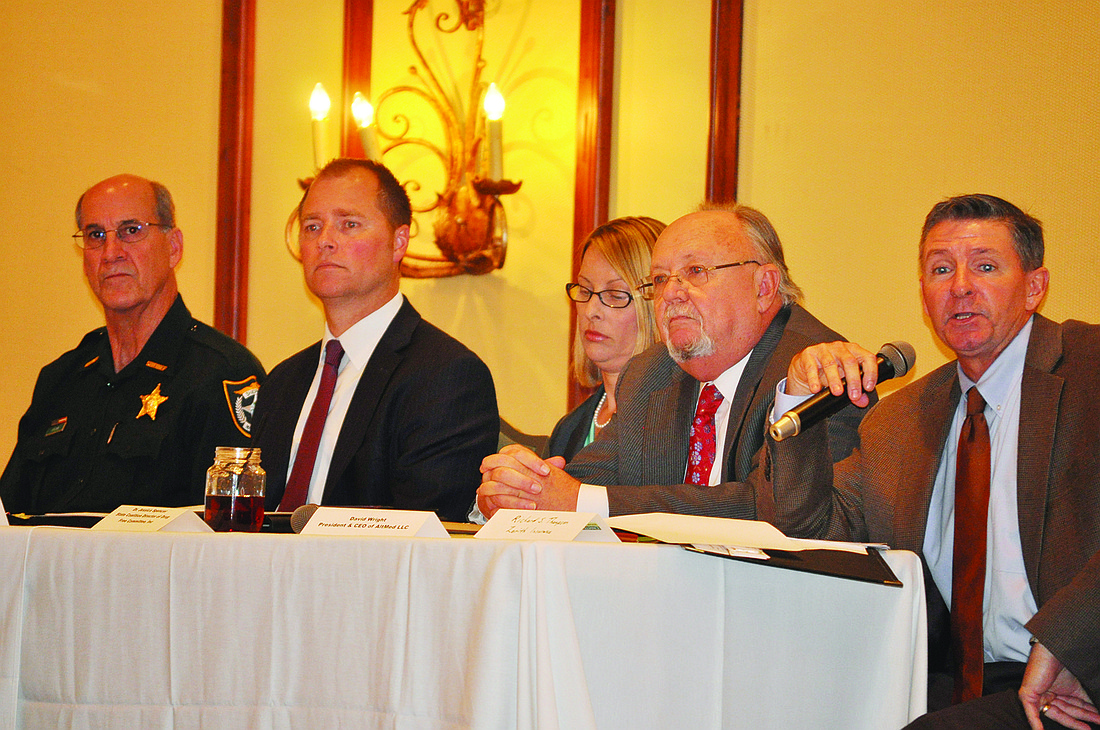- April 23, 2024
-
-
Loading

Loading

LAKEWOOD RANCH — How will the possible passing of Amendment 2 affect my business?
That’s the question Lakewood Ranch Business Alliance members wanted answered during an Oct. 8 forum at the Polo Grill and Bar.
Amendment 2 has raised many questions and debate throughout the state of Florida ahead of the Nov. 4 election.
And a panel of five local members at the forum was indicative of a state still wrestling with the issue.
David Wright, chief executive officer and president of Lakewood Ranch-based AltMed LLC, is vested in the interest of medical cannabis. His company will produce medical marijuana should Amendment 2 pass.
Wright is fully in support of Amendment 2, formally known as the Florida Right to Medical Marijuana Initiative, which would allow individuals ailing from a debilitating medical condition to use marijuana to alleviate their symptoms.
Marijuana prescribed to patients under Amendment 2 would vary in strength of tetrahydrocannabinol (THC) to fit the needs of the patients. Medical marijuana, if approved, will be available in smokeable or edible forms.
Rather than support the amendment, panel member Dr. Jessica Spencer, of the State Coalition Drug Free Committee, instead expressed her support for Senate Bill 1030, also known as “Charlotte’s Web,” which was signed into law June 16 by Gov. Rick Scott.
Under the bill, individuals with conditions such as cancer, ALS and epilepsy can use a “noneuphoric” oil version of marijuana. The THC level is reduced in the Charlotte’s Web strain, thus producing a less “high” feeling than more conventional forms of marijuana.
Manatee County Sheriff Brad Steube showed his concern with who can become a caregiver under the amendment, saying that former felons convicted of drug crimes can become one because of the amendment’s broad language.
He wondered how many attendees had actually read through Amendment 2.
Not many raised their hands.
“There’s a lot more to it than what’s on the ballot,” he said.
As far as forecasting the implication of medical marijuana for the state of Florida, Steube said the statistics he has seen in states where it is already legal vary.
“I’m not sure what’s going to happen here,” Steube said.
Wright sees medical marijuana as a safer alternative to commonplace pain medications.
“We are providing patients in need with an effective alternative to pain and suffering,” Wright said.
Spencer views Amendment 2 as a law drawn up with significant loopholes that could authorize non-Florida residents and people of all ages to gain access to medical marijuana.
“I’m here to protect kids and families from this loophole,” Spencer said.
Matthew Westerman, a local business litigation attorney, said while businesses can ban marijuana use from current and prospective employees, problems may arise if the subject has been prescribed medical marijuana.
Richard Thompson, vice president of the claims legal department for Zenith Insurance, said he thinks there will be worker’s compensation issues. He said the legalization of marijuana has not been a worker’s comp issue, though, for California.
Panelists suggested attendees research Amendment 2.
“You need to be an informed voter,” Spencer said. “A ‘yes’ is yes for forever. A ‘no’ is for not right now.”
MARIJUANA LEGALIZATION TIMELINE
1996 - California
1998 - Alaska, Oregon, Washington
1999 - Maine
2000 - Hawaii, Colorado, Nevada
2004 - Montana, Vermont
2006 - Rhode Island
2007 - New Mexico
2008 - Michigan
2010 - New Jersey, Washington, D.C.
2011 - Delaware
2012 - Connecticut, Massachusetts
2013 - New Hampshire
2014 - Minnesota, New York